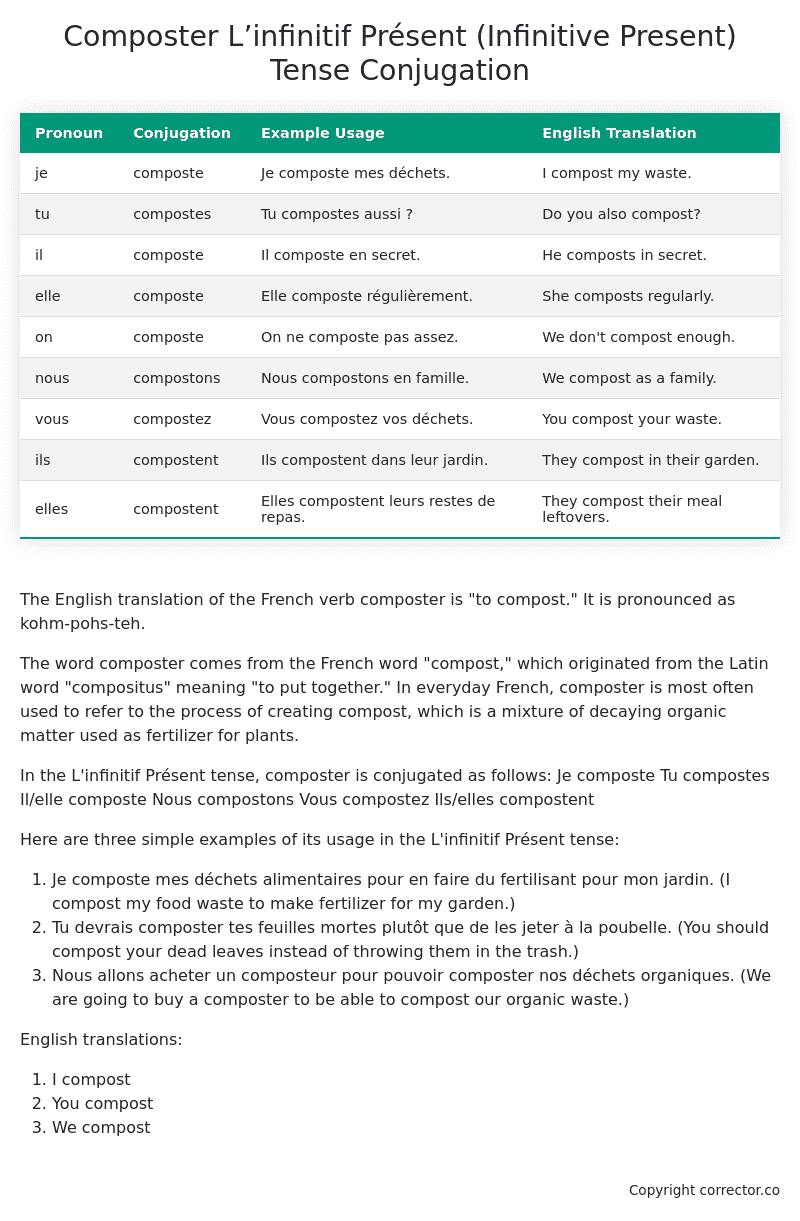L’infinitif Présent (Infinitive Present) Tense Conjugation of the French Verb composter
Introduction to the verb composter
The English translation of the French verb composter is “to compost.” It is pronounced as kohm-pohs-teh.
The word composter comes from the French word “compost,” which originated from the Latin word “compositus” meaning “to put together.” In everyday French, composter is most often used to refer to the process of creating compost, which is a mixture of decaying organic matter used as fertilizer for plants.
In the L’infinitif Présent tense, composter is conjugated as follows:
Je composte
Tu compostes
Il/elle composte
Nous compostons
Vous compostez
Ils/elles compostent
Here are three simple examples of its usage in the L’infinitif Présent tense:
- Je composte mes déchets alimentaires pour en faire du fertilisant pour mon jardin. (I compost my food waste to make fertilizer for my garden.)
- Tu devrais composter tes feuilles mortes plutôt que de les jeter à la poubelle. (You should compost your dead leaves instead of throwing them in the trash.)
- Nous allons acheter un composteur pour pouvoir composter nos déchets organiques. (We are going to buy a composter to be able to compost our organic waste.)
English translations:
- I compost
- You compost
- We compost
Table of the L’infinitif Présent (Infinitive Present) Tense Conjugation of composter
| Pronoun | Conjugation | Example Usage | English Translation |
|---|---|---|---|
| je | composte | Je composte mes déchets. | I compost my waste. |
| tu | compostes | Tu compostes aussi ? | Do you also compost? |
| il | composte | Il composte en secret. | He composts in secret. |
| elle | composte | Elle composte régulièrement. | She composts regularly. |
| on | composte | On ne composte pas assez. | We don’t compost enough. |
| nous | compostons | Nous compostons en famille. | We compost as a family. |
| vous | compostez | Vous compostez vos déchets. | You compost your waste. |
| ils | compostent | Ils compostent dans leur jardin. | They compost in their garden. |
| elles | compostent | Elles compostent leurs restes de repas. | They compost their meal leftovers. |
Other Conjugations for Composter.
Le Present (Present Tense) Conjugation of the French Verb composter
Imparfait (Imperfect) Tense Conjugation of the French Verb composter
Passé Simple (Simple Past) Tense Conjugation of the French Verb composter
Passé Composé (Present Perfect) Tense Conjugation of the French Verb composter
Futur Simple (Simple Future) Tense Conjugation of the French Verb composter
Futur Proche (Near Future) Tense Conjugation of the French Verb composter
Plus-que-parfait (Pluperfect) Tense Conjugation of the French Verb composter
Passé Antérieur (Past Anterior) Tense Conjugation of the French Verb composter
Futur Antérieur (Future Anterior) Tense Conjugation of the French Verb composter
Subjonctif Présent (Subjunctive Present) Tense Conjugation of the French Verb composter
Subjonctif Passé (Subjunctive Past) Tense Conjugation of the French Verb composter
Subjonctif Imparfait (Subjunctive Imperfect) Tense Conjugation of the French Verb composter
Subjonctif Plus-que-parfait (Subjunctive Pluperfect) Tense Conjugation of the French Verb composter
Conditionnel Présent (Conditional Present) Tense Conjugation of the French Verb composter
Conditionnel Passé (Conditional Past) Tense Conjugation of the French Verb composter
L’impératif Présent (Imperative Present) Tense Conjugation of the French Verb composter
L’infinitif Présent (Infinitive Present) Tense Conjugation of the French Verb composter (this article)
Struggling with French verbs or the language in general? Why not use our free French Grammar Checker – no registration required!
Get a FREE Download Study Sheet of this Conjugation 🔥
Simply right click the image below, click “save image” and get your free reference for the composter L’infinitif Présent tense conjugation!

Composter – About the French L’infinitif Présent (Infinitive Present) Tense
Forming the Infinitive Present
Common Everyday Usage Patterns
As a Verb’s Dictionary Form
After Modal Verbs
As an Imperative
In Infinitive Clauses
Interactions with Other Tenses
Present Tense
Future Tense
Conditional Tense
Passé Composé
Imperfect Tense
Subjunctive and Conditional Moods
Summary
Want More?
I hope you enjoyed this article on the verb composter. Still in a learning mood? Check out another TOTALLY random French verb conjugation!


